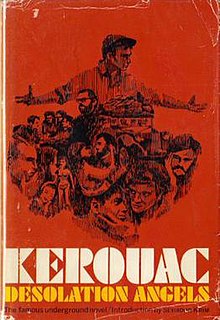Desolation Angels (Novel)

First US edition
|
|
| Author | Jack Kerouac |
|---|---|
| Country | United States |
| Language | English |
| Series | Duluoz Legend |
| Publisher | Coward McCann |
|
Publication date
|
1965 |
| Media type | Print (Hardback & Paperback) |
| Pages | 366 pg |
| Preceded by | Visions of Gerard (1963) |
| Followed by | Satori in Paris (1966) |
Desolation Angels is a semi-autobiographical novel written by Beat Generation author Jack Kerouac, which makes up part of his Duluoz Legend. It was published in 1965, but was written years earlier, around the time On the Road was in the process of publication. According to the book's foreword, the opening section of the novel is taken almost directly from the journal he kept when he was a fire lookout on Desolation Peak in the North Cascade mountains of Washington state. Much of the psychological struggle which the novel's protagonist, Jack Duluoz, undergoes in the novel reflects Kerouac's own increasing disenchantment with the Buddhist philosophy with which he had previously been fascinated.
All of Kerouac's Duluoz legend's characters were based on others that were present within his life.
"Because of the objections of my early publishers I was not allowed to use the same personae names in each work."
Kerouac was not particularly conscientious about masking the identities of his friends in this work. Partway through Chapter 91, there is the line, "'Who wants to ride freight trains!' -Gregory- 'I dont dig all this crap where you ride freight trains and have to exchange butts with bums-'". Somehow both Kerouac and the editors missed that "Gregory" was not changed to "Raphael". Similarly, the locals of Tangiers call Old Bull Hubbard (Burroughs) "Boorows" in Chapter 52 of Book 2. In Chapter 43, he refers to "...the Sundays in Neal Cassady's writings..." The editors may have ignored this, since it refers to Neal as a writer instead of a friend. In Part 1 of Book 2 the locals are said to call Old Bull Gaines (Garver) "Senor Gahr-va". And in Chapter 80, the discussion of the meanings of Urso and Pomeray's names leads to a less than clear comparison to the name Corso.
The book is broken up into two sections called Desolation Angels and Passing Through, which are then subdivided into many shorter parts. Each part focuses on a specific location where Kerouac is at that time. The first section covers Kerouac's time on the mountain and immediately after he leaves the fire lookout. The foreword of the book mentions that Kerouac was hoping to get the second section, Passing Through, published as a standalone novel.
...
Wikipedia
